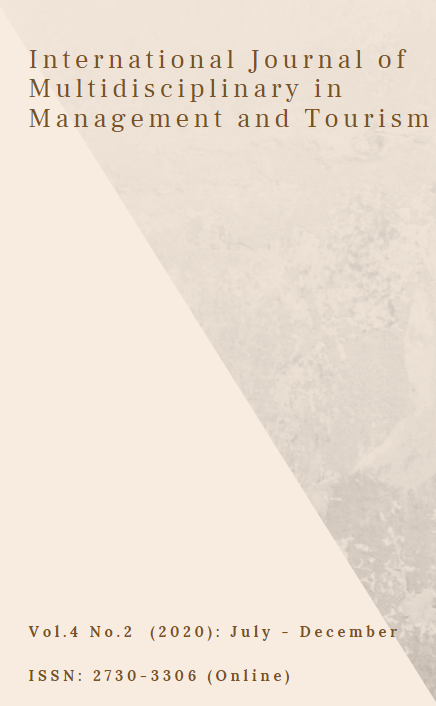A Community-based Case Study of Coffee Farming in Thailand
Main Article Content
Abstract
Coffee farming is very important to Chiang Rai, Thailand, and most of the coffee crops are produced in the highlands of ethnicity-crowded communities. Nevertheless, a rich case understanding of how the coffee farming has been practicing is lacking. Relying on in-depth interviews and field observations, this study presents how a specialty coffee farmer integrates sustainable farming practices and market orientations in a management framework that resembles balanced scorecard (BSC) and strategy mapping concepts. The case illuminated is award-winner which testifies to the central role of sustainability principle and motivators to stimulate learning and growth of the farmer, and in turn, contributes to continuing improvement of farming, coffee-making and marketing processes, to contribute to the sustainability aspects of performances. The semi-structured interview protocols, which provide the guidelines to guide the interviewing process, are facilitated using the CATWOE-guided root definition concept of the soft-systems methodology (SSM) to ensure triangulated coverage of important respondents and the coverage scopes for systemic insights.
Article Details
References
Atkinson, A.A., Balakrishnan, R., Booth, P., Cote, J., Grout, M.T., Mali, T. et al.. (1997). New Directions in Management Accounting Research. Journal of Management Accounting Research, 9, 79-108.
Boone, L., Roldan-Ruiz, I., Van Linden, V., Muylle, H., & Dewulf, J. (2019). Environmental Sustainability of Conventional and Organic Farming: Accounting for Ecosystem Services in Life Cycle Assessment. Science of the Total Environment, 695(133841) https://doi.org/10.1016/j.scitotenv.2019.133841.
Checkland, P.B. (1981). Systems Thinking, Systems Practice. Chichester: Wiley.
Checkland, P.B. (1985). From Optimizing to Learning: A Development of Systems Thinking for the 1990s. Journal of the Operational Research Society, 36, 757.
Checkland, P.B.. (1989). Soft Systems Methodology. in J. Rosenhead (Ed.). Rational analysis for a problematic world. Chichester: Wiley.
Galdeano-Gomez, E., Aznar-Sanchez, J.A., Perez-Mesa, J.C. & Piedra-Munoz, L. (2017). Exploring Synergies among Agricultural Sustainability Dimensions: An Empirical Study on Farming System in Almeria (Southeast Spain). Ecological Economics,140, 99-109.
Garlough, D., Gordon, W., & Bauer, S.. (2008). The Complete Reference for Consuming Wisely. Washington: National Geographic Society.
Hoque, Z. (2014). 20 Years of Studies on the Balanced Scorecard: Trends, Accomplishments, Gaps and Opportunities for Future Research. The British Accounting Review, 46, 33-59.
Huarng, K.H. and Mas-Tur, A.. (2015). Spirit of Strategy (S.O.S.): The New S.O.S. for Competitive Business. Journal of Business Research, 1. http://dx.doi.org/10.1016 /j.jbusres.2015.01.019.
Jackson, M.C. (2000). Systems Approaches to Management. New York: Kluwer Academic/Plenum Publishers.
Jezeer, R.E., Santos, M.J., Boot, R.G.A., Junginger, M., & Verweij, P.A. (2018). Effects of Shade and Input Management on Economic Performance of Small-Scale Peruvian Coffee Systems. Agricultural Systems, 162, 179-190.
Jha, S., Bacon, C.M., Phipot, S.M., Ernesto Mendez, V., Laderach, P., & Rice, R.A. (2014). Shade Coffee: Update on a Disappearing Refuge for Biodiversity. Bioscience, 64, 416-428.
Kaplan R.S., Norton D.P. (2004). Strategy Maps: Converting Intangible Assets into Tangible Outcomes. Boston: Harvard Business School Press.
Kaplan, R.S., & Norton, D.P. (2001). The Strategy-Focused Organization. USA: Harvard Business School Press.
Kates, R.W., Parris, T.M., & Leiserowitz, A.A.. (2005). What is Sustainable Development? Goals, Indicators, Values, and Practice. Environment, 47(3), 8-21.
Mahajan, G. (2016). Value Creation: The Definitive Guide for Business Leaders. United Kingdom: SAGE Publications.
Mulinde, C., Majaliwa, J.G.M., Twinomuhangi, R., Mfitumukiza, D., Komutunga, E., Ampaire, E., Asiimwe, J., Asten, P.V., & Jassogne, L. (2019). Perceived Climate Risks and Adaptation Drivers in Diverse Coffee Landscapes of Uganda. Journal of Life Sciences, 88 31-44.
Rahn, E., Liebig, T., Ghazoul, J., Van Asten, P., Laderach, P., Vaast, P., Sarmient, A., Garcia, C., & Jassogne, L. (2018). Opportunities for Sustainable Intensification of Coffee Agro-Ecosystems along an Altitudinal Gradient on Mt. Elgon, Uganda. Agriculture, Ecosystems and Environment, 263, 31-40.
Ssbunya, B.R., Schader, C., Baumgart, L., Landert, J., Altenbuchner, C., Schmid, E., & Stolze, M. (2019). Sustainability Performance of Certified and Non-Certified Smallholder Coffee Farms In Uganda. Ecological Economics, 156, 35-47.
Stoorvogel, J.J., Antle, J.M., Crissman, C.C., & Bowmen, W. (2004). The Tradeoff Analysis Model: Integrated Bio-Physical and Economic Modeling of Agricultural Production Systems. Agricultural Systems, 80(1), 43-66.
Tan, C. C. & Sitikarn, B. (2019). Balanced Scorecard (BSC) Structured Business Model for Tribes-Based Community-Based Tourism: Cases with Chiang Rai. Journal of MCU Peace Studies, 7(4), 899-922.
Tan, C. C. (2018). Giving strategic management an epistemological structure: A case of community-based tourism. National Academy of Managerial Staff of Culture and Arts Herald, 1, 723-733.
Thida, A. and Tan, C.C. (2019). The Supply Chain Balanced Scorecard Structure of Strategy Map for Rice Milling Business Performance: Ayeyarwady Region, Myanmar. Paper presented to the 6th Greater Mekong Subregion International Conference (GMSIC) 2019, July 12, 2019, University of Management and Economics, Kampong Cham Campus, Cambodia, with Khon Kaen University, 26-36.
Tueth, M.. (2010). Fundamentals of Sustainable Business: A Guide for the Next 100 Years. Singapore: World Scientific Publishing.
Yin, R.K. (1994). Case Study Research: Design and Methods. Newbury Park: Sage Publishing.
Young, S.T., & Dhana, K.K. (2013). Sustainability: Essentials for Business. California: SAGE Publications.

